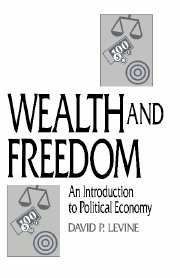Book contents
- Frontmatter
- Contents
- List of figures and tables
- Preface
- Introduction
- I Economy and society
- II Capitalism
- III Inequality and difference
- 7 The classical argument for inequality
- 8 Income and productive contribution
- 9 Rights and the market
- 10 Poverty and inequality
- IV International society
- V Individual and community
- References
- Index
7 - The classical argument for inequality
Published online by Cambridge University Press: 20 March 2010
- Frontmatter
- Contents
- List of figures and tables
- Preface
- Introduction
- I Economy and society
- II Capitalism
- III Inequality and difference
- 7 The classical argument for inequality
- 8 Income and productive contribution
- 9 Rights and the market
- 10 Poverty and inequality
- IV International society
- V Individual and community
- References
- Index
Summary
Differences between persons
Everything we have learned so far about a capitalist economy suggests that it fosters inequalities of income and wealth. Indeed, such inequalities follow directly from the basic principle of capitalism that income depends on property and thus livelihood on exchange. Each individual owns different property. Some own labor, some capital. Among those who labor, some get more in exchange for it than others. When we sell our capacities to acquire the money we need to satisfy our wants, our ability to satisfy our wants depends on the price we get. This price can vary dramatically, depending on the capacities we own and the market for them.
Markets value property according to the demand for it and, in this sense, its usefulness to others. Different individuals own different kinds of labor. A doctor's labor differs from that of a bricklayer, a professional athlete's from that of a cook, a stockbroker's from that of a teacher. What benefit do we gain from allowing these differences to form the basis for inequalities of income and wealth?
In our world inequalities require justification. This need to justify inequality stems from our underlying commitment to a notion of equality: that all persons should be treated equally, be afforded equal opportunity to develop and realize their capacities, and have their rights respected as private persons and as citizens. This assumption of equality makes inequality problematic.
- Type
- Chapter
- Information
- Wealth and FreedomAn Introduction to Political Economy, pp. 77 - 87Publisher: Cambridge University PressPrint publication year: 1995



